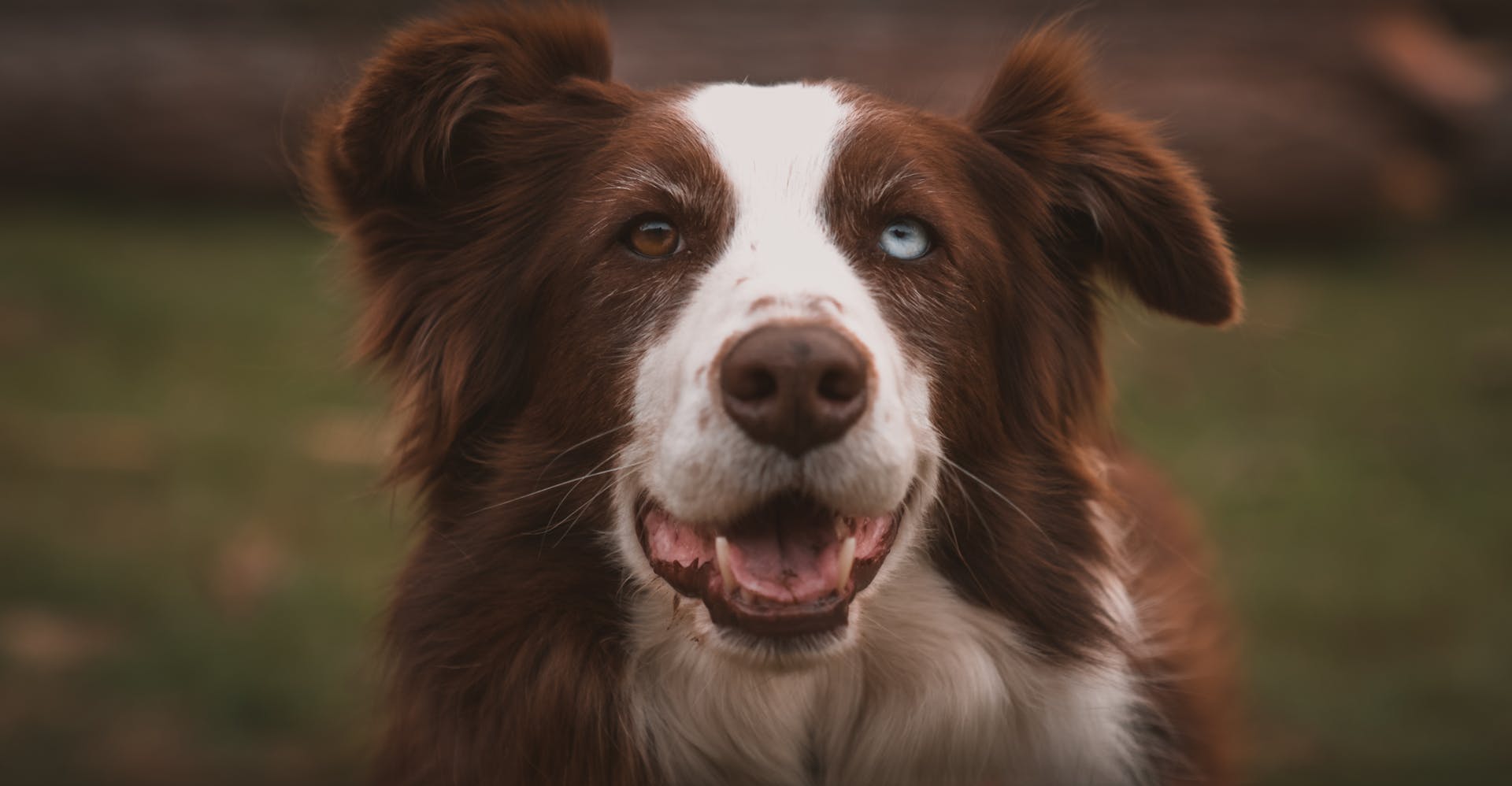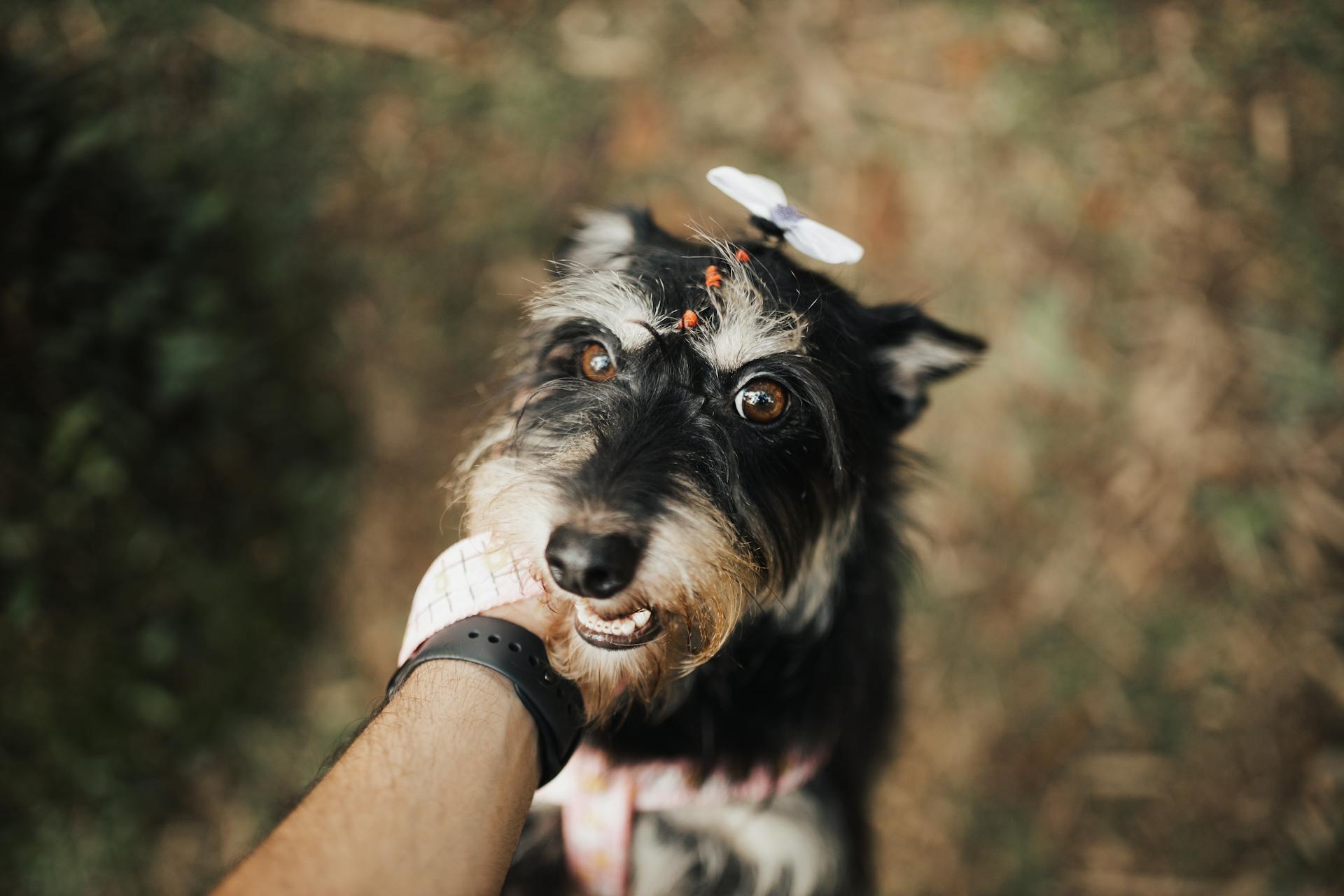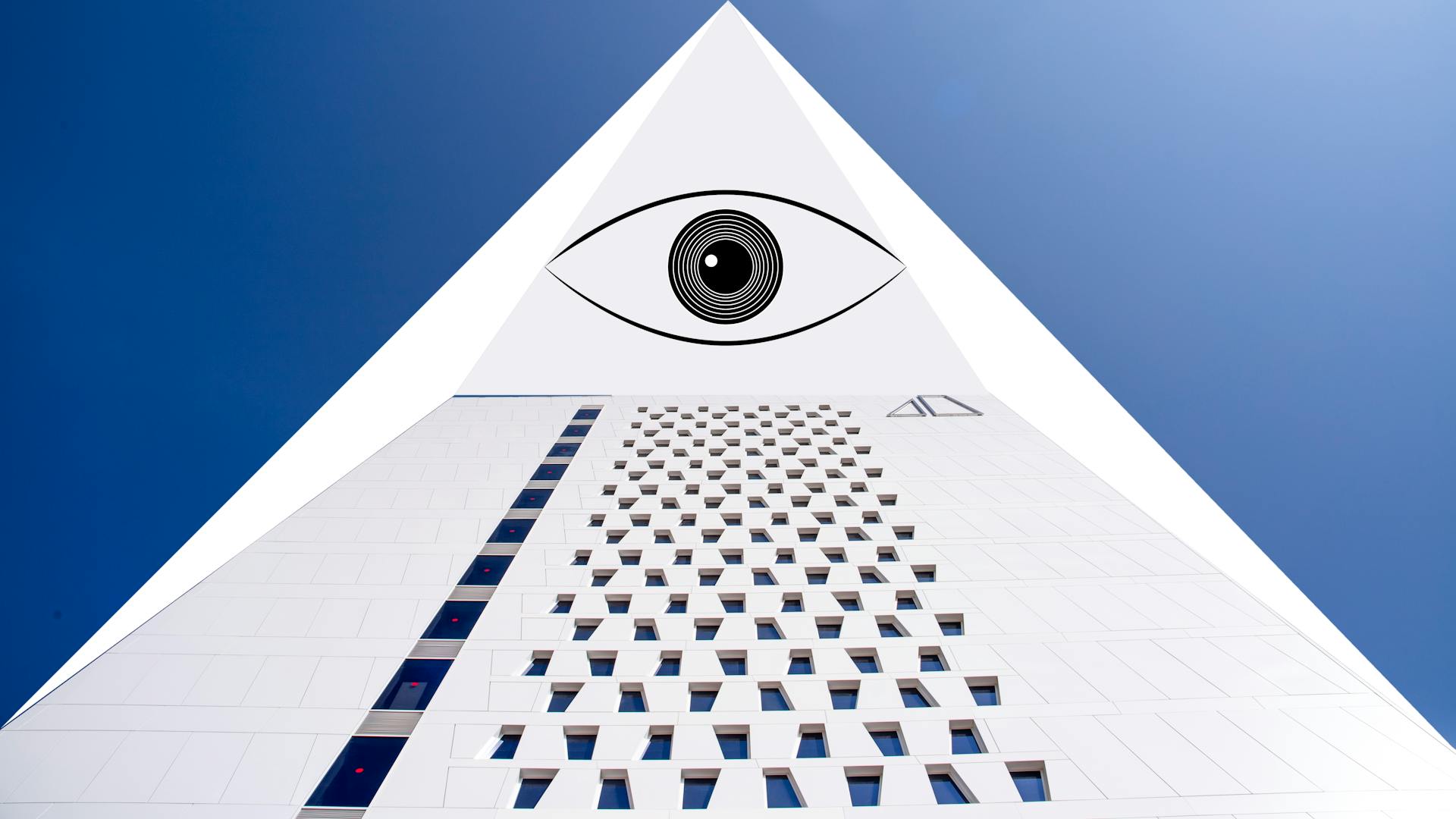
Shih Tzus are prone to eye infections due to their short, flat face and large eyes, which can trap dirt and bacteria.
Shih Tzus are at risk of developing eye infections, particularly conjunctivitis and blepharitis, which can cause redness, swelling, and discharge.
Eye infections can be painful and uncomfortable for your Shih Tzu, so it's essential to recognize the symptoms and take prompt action to prevent complications.
Common symptoms of eye infections in Shih Tzus include squinting, pawing at the eyes, and excessive tearing.
Check this out: Shih Tzu Bloodshot Eyes
What Causes Eye Infections
Eye infections in Shih Tzus can be a real concern, and it's essential to understand what causes them. One of the most common causes is a corneal abrasion, which can occur due to trauma, such as a grain of sand entering the eye or a thorn cutting the cornea.
Trauma can happen in various ways, including when a dog rubs at their eye or rushes through bushes, a particular risk in hunting dogs. Shih Tzus, with their flat face and short nose, may be more prone to eye injuries due to their unique facial structure.
Another common cause of eye infections in dogs is dry eye syndrome, also known as keratoconjunctivitis sicca. This condition can lead to a lack of tears and the accumulation of mucus, which can turn green or yellow due to an overwhelming number of bacteria.
In addition, infection of the eyelids can also lead to an eye infection in dogs, causing the eyelids to become swollen, red, and lumpy. These cases should be seen by a veterinarian within a week of presenting symptoms.
Here are some common causes of eye infections in dogs:
- Bacterial, viral, and fungal infections
- Foreign bodies, irritants, and injury to the eyes
- Parasites
It's worth noting that some eye conditions can appear similar to eye infections, and it's always best to consult a veterinarian if your Shih Tzu is experiencing any eye problems.
Signs and Symptoms
If you notice your Shih Tzu is pawing at their eyes or keeping them closed, it could be a sign of an eye infection. This behavior is often accompanied by excessive tearing, yellow-green discharge, or a prolapse of the third eyelid.
Excessive winking or blinking, especially in one eye, can also indicate an eye infection. In some cases, the discharge from the eye may be yellow or green in color. Red or pink discoloration in the whites of the eyes or around the eyelids is another common symptom.
If your Shih Tzu is experiencing light sensitivity or swollen eyelids, it's a good idea to take them to the vet. These symptoms can be accompanied by a range of other signs, including pawing at the eyes, itching, or discharge coming from the eye.
Here are some common symptoms of eye infections in dogs, including Shih Tzus:
- Pawing or itching at the eyes
- Discharge coming from the eye
- A pink or red looking eye
- Eye swollen shut or more mild swelling around the eye
- Excessive blinking
- Light sensitivity
- Squinting
- Changes in the eye’s appearance
- Signs of pain
- Sudden poor vision
Keep in mind that any problems with the eyes are not normal in dogs, and it's always best to consult with a vet if you notice any unusual symptoms.
Diagnosis and Treatment
A diagnosis from a veterinarian is key to treating a shih tzu eye infection. They will take a history of symptoms and conduct a comprehensive eye exam for diagnosis and prescription of appropriate treatment.
Your veterinarian will likely take a look at your dog's eye and then decide from there what kinds of tests that they should do. This may include a measurement of tear production, fluorescein stain uptake, or the measurement of eye pressure.
For bacterial eye infections, antibiotics are normally prescribed, while fungal eye infections are treated with antifungal medications. In some cases, trauma to the eyes may need further or more advanced treatment than this.
How Are Diagnosed
A veterinarian will likely take a look at your dog's eye and then decide from there what kinds of tests that they should do.
The type of test needed will depend on the suspected cause of the eye infection, such as a bacterial infection which may require a culture of the eye discharge.
In some cases, eye conditions in dogs are mistaken for eye infections, so your vet may run some more tests on your dog's eyes.
Discover more: Pug Dog Eye Problems

The intraocular pressure test is used to test for glaucoma, while eye drops can allow vets to look for other abnormalities in the eyes.
Eye conditions like glaucoma are not really eye infections, but they can appear very similar symptom-wise, which is why they're often mistaken for eye infections by dog owners.
Treatment
Treatment for dog eye infections depends on the cause, and your veterinarian will prescribe the necessary medication and treatment plan. Antibiotics are often used to treat bacterial eye infections, while antifungal medications are used for fungal infections.
If your dog has a corneal ulcer, your veterinarian may prescribe topical antibiotics to help clear up the infection. For dry eye symptoms, artificial tears can provide relief, but a veterinarian-prescribed tear stimulant is often necessary to promote natural tearing.
In some cases, oral antibiotics and anti-inflammatory drugs may be prescribed to treat eyelid infections. It's essential to give your dog the medication as directed by your veterinarian, whether it's eye drops or oral medication.
Take a look at this: Dog Shows White of Eye
To prevent further irritation, your veterinarian may recommend placing an Elizabethan collar or cone on your dog to prevent them from rubbing at their eyes.
Here are some common treatments for dog eye infections:
- Topical antibiotics for corneal ulcers
- Artificial tears for dry eye symptoms
- Oral antibiotics and anti-inflammatory drugs for eyelid infections
- Tear stimulants to promote natural tearing
- Elizabethan collars or cones to prevent eye rubbing
In severe cases, trauma to the eyes may require more advanced treatment, and immediate emergency veterinary care is necessary. Your veterinarian will work with you to determine the best course of treatment for your dog's specific eye infection.
For another approach, see: Shih Tzu Ear Infection Home Treatment
Prevention and Care
To prevent eye infections in your Shih Tzu, keep the hair around their eyes trimmed to prevent irritation and scratches. This can be done by trimming the hair every few weeks to keep it from getting into their eyes.
Trimming the hair around their eyes is just one part of keeping their face clean, which is essential to preventing eye infections. Use a wet face cloth or disposable dog wipes daily to clean their face and prevent bacteria from forming.
Here's an interesting read: Shih Tzu Cloudy Eye Treatment
You can also protect your Shih Tzu's eyes with dog goggles, especially on windy days when debris like sand and dust can get into their eyes. Consider applying artificial tears before and after a walk on windy days to help flush out foreign bodies.
Here are some key tips to keep in mind:
- Keep the hair around your Shih Tzu's eyes trimmed
- Clean their face daily with a wet face cloth or disposable dog wipes
- Use dog goggles on windy days to protect their eyes
Infection in Lids
Infections around the eyelids and tear glands are common in dogs and can cause discomfort and discharge in the eye. This type of eye infection requires prompt attention from a veterinarian.
Your dog may exhibit symptoms such as yellow or green discharge from the eye, slight winking or blinking, or keeping the eyelids closed. These symptoms can be accompanied by red or pink discoloration in the whites of the eyes or around the eyelids.
Infections around the eyelids and tear glands can be treated with oral antibiotics and anti-inflammatory drugs prescribed by a veterinarian. Regular veterinary check-ups can help prevent and detect eye infections early on.
If your dog's eye infection is caused by an eyelid problem, a veterinarian may prescribe oral antibiotics and anti-inflammatory drugs to help clear up the infection.
Check this out: What Does Shih Tzu Mean
Treating at Home
Don't try to treat your dog's eye infection on your own with human medications or previous prescriptions, as they may worsen the condition.
If you've been prescribed medication by your veterinarian, be sure to give it to your dog exactly as directed, whether it's eye drops or oral medication.
Placing an Elizabethan collar or cone on your dog can help prevent them from rubbing at their eyes and further traumatizing them.
Flushing the eye with a cotton ball saturated in lukewarm water can help rinse it until you can get to the vet or emergency vet.
If the eye infection doesn't resolve within 20 hours, it's essential to seek veterinary care to prevent the infection from getting out of control.
How to Prevent
Preventing eye infections in dogs is crucial to maintaining their eye health. Regular grooming is essential, so trim the bushes around your yard to prevent debris from blowing into your dog's eyes.
Trimming your dog's fur around the eyes is also vital. This will prevent long hairs from getting into their eyes and causing irritation. I've seen many dogs with eye infections, and it's often due to long hair getting into their eyes.
Keeping your dog's face clean is another crucial step in preventing eye infections. Use a wet face cloth or disposable dog wipes daily to prevent bacteria from forming and leading to infections. A dirty face can seep into your dog's eye area, so make sure to clean their face regularly.
Protective eye wear, such as dog goggles, can also help prevent eye infections. These goggles will help protect your dog's eyes from debris like dust, sand, and other foreign bodies that can cause infections. I've seen dogs wear these goggles and they're incredibly effective.
Here are some common causes of tear stains under a dog's eyes:
- Excessive tearing due to irritation
- Shallow eye sockets
- Eyelids that are turned inward
- Hair growth around the eye
- Blocked tear drainage holes (puncta)
If you notice any of these conditions, it's essential to take action to prevent eye infections. Regular grooming, face cleaning, and protective eye wear can go a long way in maintaining your dog's eye health.
Differentiating Between Allergies
If only one eye is affected, it's likely due to infection or inflammation. Both eyes could be affected if the cause is allergies.
Allergic situations are systemic, meaning they can affect the whole body, including both eyes. This is why both eyes are often affected by allergies.
Allergic conjunctivitis is a common cause of eye infection in dogs, especially after swimming in dirty water. The pink tissue around the eye, or conjunctiva, becomes irritated and red.
Increased tearing and blinking can occur due to allergic conjunctivitis. This can lead to increased trauma to the eyelids due to rubbing.
Seek veterinary care within the first 24 hours if you notice increased tearing and blinking.
Intriguing read: Shih Tzu Eyes Pop Out
Corneal Issues
Shih Tzus are prone to corneal issues, and one of the most common problems is distichiasis and trichiasis, where eyelashes grow in the wrong direction and rub against the eye.
These abnormal eyelashes can cause irritation and discomfort, leading your dog to wipe at their eyes a lot.
Distichiasis and trichiasis can be treated by a veterinarian, but a plucked eyelash will only grow back.
Because Shih Tzus are vulnerable to a variety of health issues, their eyes should always be watched for any signs of abnormality by the owner.
Regular monitoring can help catch problems early, and prompt veterinary care can prevent serious issues from developing.
Some owners have reported success in reducing eye discharge in Shih Tzus by giving them a teaspoon of organic virgin coconut oil daily.
This can make a big difference in the health and comfort of your dog's eyes, and may even reduce the need for daily eye cleaning.
Frequently Asked Questions
Can a dog's eye infection heal on its own?
No, a dog's eye infection typically requires veterinary attention to heal properly, as it can cause severe pain and potentially lead to blindness. Prompt veterinary care is essential to prevent long-term damage.
Is it normal for Shih Tzu to have eye discharge?
Yes, it's normal for Shih Tzus to have eye discharge, but excessive amounts may indicate a problem
Featured Images: pexels.com


